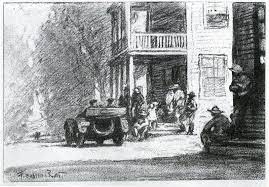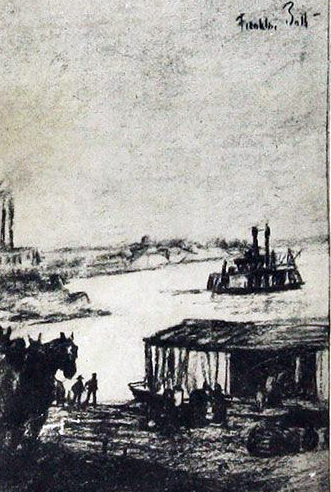“The Piety And Eggs Of Paterson” is Dreiser’s version of a picnic gone wrong. It’s strategically placed at the start of A Hoosier Holiday because Dreiser meant it as a metaphor for what is to come and how his motor trip from New York to Terre Haute will end. “We are all such pathetic victims of chance, anyhow.” Dreiser ends his narrative, “We are born, we struggle, we plan, and chance blows all our dreams away. . . . Of dreams and the memory of them is life compounded.”
Dreiser’s life and “dreams” are invariably messy. When he took his motor trip, he was in a foul mood. Many love affairs complicated his marriage. The Society for the Prevention of Vice censored The Genius and he was angry at his publisher for not adequately defending him. Fortuitously, he eagerly accepted Franklin Booth’s offer to motor in his posh Pathfinder from New York to Indiana.
Chauffeured by a man known only as Speed, Dreiser, Boot, and a woman named Miss H, they headed west. Dreiser’s expectations, as well as his spirits, were mixed. Edgar Lee Masters’s firsthand recollection is that Dreiser was full of questions, objections, distinctions, instances, and contemptuous, ironical, remote, cloudy, irreverent, ferocious, fearless, grim, compassionate, and hateful
Just starting and looking for a place to have a picnic lunch, they settled along the Delaware River. Dreiser writes that it was idyllic, “all so lovely that it seemed a bit out of fairyland or a sketch by Watteau.” Dreiser gently mocks Booth to get rid of any pest. “Franklin being a Christian Scientist, it was his duty, as I explained to him, to “think” any flies or mosquitoes away to “realize” for us all that they could not be, and so leave us to enjoy our meal in peace.” Pests are one minor consideration, but when Booth tastes his egg, it rotten: “He crushed the shell, and after stripping the glistening surface dipped it in salt. I wondered would it be good. Then he bit into it and paused, took up a napkin with a very graceful and philosophic air, and wiped his mouth. I was not quite sure what had happened. “Was your egg good?” he said finally, examining me with an odd expression. “It was not, “I replied. “The most villainously bad egg I have had in years. And here it goes, straight to the fishes.”
When Booth tolerantly explains that the storekeeper took advantage of him, Dreiser says, “Oh no, “I replied, “not to a full-fledged Christian Scientist! Never! These eggs must be perfect. The error is with us. We have thought bad eggs, that’s all.” They throw their beer bottles into the water, get into the car and drive on, Dreiser optimistically thinking, “there are to be two whole weeks of this in this glorious August weather. What lovely things we shall see.”
Featured Image: Leaving New York
See Theodore Dreiser. A Hoosier Holiday with Illustrations by Franklin Booth. New York: Joh Lane, 1916. Reprint, Indiana University Press,1997 with an Introduction by Douglas Brinkley; Edgar Lee Masters. “Theodore Dreiser—A Portrait” (1915)
*Booth was a steady illustrator of the social-political magazine Masses and a closeted gay man. Neither of which Dreiser bothers about.

